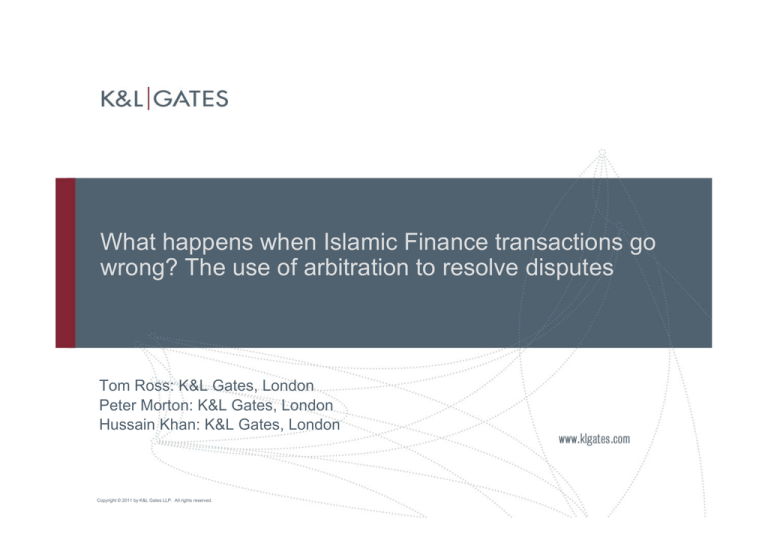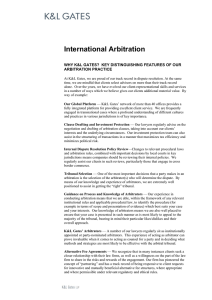
What happens when Islamic Finance transactions go
wrong? The use of arbitration to resolve disputes
Tom Ross: K&L Gates, London
Peter Morton: K&L Gates, London
Hussain Khan: K&L Gates, London
Copyright © 2011 by K&L Gates LLP. All rights reserved.
Sharia Compliant Finance and Applicable Law
Huge growth in Sharia compliant products.
Many Sharia compliant finance transactions are
governed by English law or the law of another country.
Sharia is a set of moral and religious principles rather
than a codified body of laws.
Sharia compliant transactions may involve parties
from many jurisdictions.
2
Tendency to Favour Litigation
Historic reasons for antipathy towards arbitration:
Scepticism towards alternative forms of dispute
resolution amongst entities working in Sharia
compliant finance e.g.
Current practice in Malaysia.
Aramco and experience in the Kingdom of Saudi
Arabia.
3
Issues to Consider When Choosing
Traditional Litigation
Two principal issues:
Difficulty of reconciling English law (and the laws of
other jurisdictions where the Rome Convention
applies) with Sharia principles, e.g.
Beximco: Sharia law not capable of being a
governing law.
Halpern: Detailed contractual provision required
to incorporate Sharia principles.
Lack of judicial understanding of Sharia
principles.
Enforcement
4
Beximco
Beximco established:
Sharia was not capable of being a governing law for
the purposes of the Rome Convention.
Sharia law was not capable of guiding the application
of English law, as there were as there were too many
possible interpretations of Sharia law.
5
Halpern
Halpern established:
If Sharia law principles are to be contractually agreed
then these need to be spelt out or “black letter”
anything less is too uncertain.
6
Judicial Understanding of Sharia Law
"Litigation is not geared towards solving these cases.
Judges often lack education in many industry
principles" (Prof. Andrew White, International Islamic Law and
Finance Centre, Singapore, July 2011)
"More often than not, judges have made flawed
statements relating to Shariah banking and finance
principles" (Nik Norzul Thani, Chairman Zaid Ibrahim & Co, Kuala
Lumpur, July 2011)
7
Enforcement (or location, location, location)
This is a largely practical consideration:
Choice of jurisdiction must be considered alongside
choice of law to determine the likely remedies
available in the event that litigation is necessary.
Where are the assets? Need to consider where the
assets of any counterparties are located and the likely
ability to enforce any award by the local Court. Is
security available (or appropriate)?
8
Traditional Litigation Can Be Suitable
Where you have international parties with global
businesses and assets in the relevant jurisdictions
then traditional litigation may be appropriate.
English law is flexible and principles can be
incorporated into contracts provided that these are
spelt out clearly.
9
But Arbitration Should be Considered …
Arbitration can also be very well suited to Sharia
compliant finance transactions and should be
considered as an alternative.
10
GROWTH OF ARBITRATION IN FINANCE
Establishment of Panel of Recognised
International Market Experts (‘PRIME’) in
Finance in 2011
New arbitration institutions / rules aimed at
Islamic finance disputes e.g.,
Kuala Lumpur - Regional Centre for Arbitration (KLRCA) – Islamic
Banking and Financial Services Arbitration Rules, 2007
Dubai - International Islamic Centre for Reconciliation and
Arbitration (IICRA), 2005
Inclusion of optional arbitration provision in the
standard ISDA/IIFM Ta’hawwut Master
Agreement, issued March 2010
11
IS ARBITRATION THE ANSWER? (1)
Some key features:
Independent and impartial tribunal (normally 1 or
3 arbitrators)
Often a neutral venue
Private and confidential
Often administered by an arbitration institution
Arbitral rules provide procedural framework
Limited grounds of appeal / challenge of the
award
12
IS ARBITRATION THE ANSWER? (2)
Potential advantages:
Input in selection of the arbitrator(s)
Ability to select a neutral venue
Procedural flexibility e.g., can agree ‘fast track’
Absence of wide ranging ‘discovery’ exercises IBA Rules of Evidence
Final and binding - no endless appeals
Privacy
Cross-border enforcement - New York
Convention 1958
No real alternative?
13
IS ARBITRATION THE ANSWER? (3)
Potential problems:
Can be expensive (n.b. fees of arbitrators and
institution)
Can take a long time
Not all potential venues (‘seats’) are arbitrationfriendly
No default / summary judgment procedures
No precedent value in arbitration award
Multi-party / multi-contract situations
Enforcement - theory vs. reality
14
WHY ARBITRATION FOR ISLAMIC FINANCE
DISPUTES?
Selection of decision maker
Ability to agree on suitable procedure (e.g.,
KLRCA and IICRA)
Confidentiality - “The Sharia fraternity prefer
arbitration due to confidentiality … goodwill
means an awful lot to the finance sector”, Sundra
Rajoo, Director of KLRCA
Possible ability to have dispute decided under
non-national system of law (n.b. seek advice /
check)
e.g., England – s46 Arbitration Act 1996 – see Sanghi
Polyesters Ltd -v- International Investor KCSC (2000) All ER
93
15
ALWAYS …
Consider, and take advice as necessary, regarding
(i) arbitration law and practice at the seat; and
(ii) the enforcement regime at the likely place of
enforcement
16
Drafting an effective arbitration clause
The perennial problem
Often treated as a standard boilerplate provision
Given little attention
Insufficient care in drafting
“Cut and paste”
Relevant factors not considered
Not tailored to the dispute
17
Benefits in having a considered and drafted
arbitration clause
Targeted, swiftly and amicably resolve disputes
Expedite resolution of disputes
Avoid lengthy expensive diversions
Avoid ill suited procedure and unintended results
18
Essential elements
Agreement to arbitrate
Type of arbitration
Scope of the arbitration
Method of appointment of arbitrators
Number of arbitrators
Place or “seat” of arbitration
Language of the arbitration
Governing law of the contract
Sharia Compliant
19
Essential element
Agreement to arbitrate
Key element
Omission can be fatal to the arbitration proceeding
20
Essential element
Type of arbitration
Administered or “institutional”
Supervised by an arbitral institution
Institution provides procedural rules
Assists with appointment of arbitrators
Institution may charge fees
“Ad hoc”
Parties decide their own rules and procedure
Frequently refer to UNCITRAL Arbitration Rules
Difficulties can arise
21
Arbitral Institutions
UAE
Dubai International Arbitration Centre (DIAC)
DIFC LCIA Arbitration Centre
Abu Dhabi Chamber of Commerce & Industry
International Islamic Centre for Reconciliation and Arbitration (IICRA)
Qatar
Qatar International Centre for Commercial Arbitration (QICCA)
Qatar Financial Centre (QFC)
Egypt
Cairo Regional Centre for International Commercial Arbitration (CRCICA)
Malaysia
Kuala Lumpur Regional Centre for Arbitration (KLRCA)
Hong Kong
International Islamic Mediation & Arbitration Centre (IMAC)
Singapore
Singapore International Arbitration Centre (SIAC)
22
Essential element
Scope of the arbitration
The categories of dispute covered
Clarity is paramount
23
Essential element
Method of appointment of arbitrators
Generally covered in institutionally administered
arbitration
In ad hoc arbitration the procedure should be
covered in the clause or by reference to another set of
Rules (e.g. UNCITRAL)
24
Essential element
Number of arbitrators
Sole arbitrator
Three person tribunal
25
Essential element
Place or “seat” of arbitration
Practical convenience
Neutrality
Legal factors
Scope for court interference
Scope for challenge to the award
Ease of enforcement
26
Essential element
Language of the arbitration
Ordinarily follow the language of the contract
Carefully consider cost implications
Impact on the pool of arbitrators, counsel and experts
27
Essential element
Governing law of the contract
Preferably separate from the arbitration clause
28
Essential element
Sharia compliant
Take advice on the requirements of the seat
Having a Muslim arbitrator in a Muslim country
Minimise risk of award not being enforced
29
Optional elements
Procedure
Remedial powers
Qualifications of the tribunal
Confidentiality
Rights of appeal
Waiver of sovereign immunity
30
Common mistakes
No equivocal choice of arbitration
“English law – arbitration, if any, London according to
ICC Rules”
“In event of a dispute the parties undertake to submit
to arbitration, but in the event of litigation the Tribunal
of Helsinki shall have authority”
“Any dispute relating to the Agreement may be
referred to arbitration. The arbitration will take place
in Brussels under ICC rules”
31
Common mistakes
Stipulate the seat and institution correctly
“Any dispute arising under this agreement shall be
resolved by arbitration at the ICC of Zurich”
“Any dispute…between the Parties arising out of or
relating to this Agreement which cannot be settled
amicably shall be referred to and determined by
arbitration in the Hague under the International
Arbitration Rules”
32
Common mistakes
Other errors
“Any dispute arising out of this contract shall be
referred to Mr X who shall act as a sole arbitrator”
“Disputes arising in connection with the agreement
shall be determined by a single arbitrator to be
appointed by the Director General of the World Health
Organization”
“Any dispute relating to this agreement shall be
submitted to arbitration…the tribunal shall publish its
award within 2 months of the terms of reference”
33
General comments
Advisable to use short model clauses recommended
by the leading arbitration institutions – “tried and
tested”
Depart from model wording with great care
Don't over prescribe – “less is more”
Ensure that all of the essential elements are covered
Not all seats are the same, take local advice as
necessary
Make sure the arbitration clause is Sharia compliant
34






